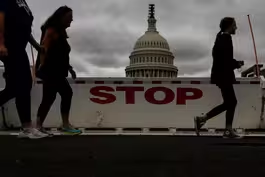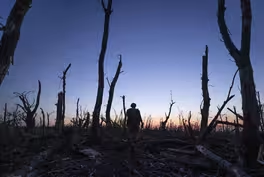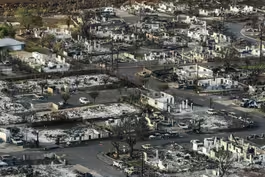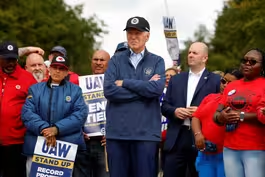
Harris calls government shutdown ‘completely irresponsible’
Clip: 9/26/2023 | 11m 7sVideo has Closed Captions
Harris calls potential government shutdown ‘completely irresponsible’
Several issues are swirling this week with potential economic and political fallout, including the ongoing auto workers strike, a looming government shutdown and the first hearing in the impeachment inquiry into President Biden. Geoff Bennett spoke to Vice President Kamala Harris about all of it at Morehouse College in Atlanta where she courted young voters as part of a month-long college tour.
Problems playing video? | Closed Captioning Feedback
Problems playing video? | Closed Captioning Feedback
Major corporate funding for the PBS News Hour is provided by BDO, BNSF, Consumer Cellular, American Cruise Lines, and Raymond James. Funding for the PBS NewsHour Weekend is provided by...

Harris calls government shutdown ‘completely irresponsible’
Clip: 9/26/2023 | 11m 7sVideo has Closed Captions
Several issues are swirling this week with potential economic and political fallout, including the ongoing auto workers strike, a looming government shutdown and the first hearing in the impeachment inquiry into President Biden. Geoff Bennett spoke to Vice President Kamala Harris about all of it at Morehouse College in Atlanta where she courted young voters as part of a month-long college tour.
Problems playing video? | Closed Captioning Feedback
How to Watch PBS News Hour
PBS News Hour is available to stream on pbs.org and the free PBS App, available on iPhone, Apple TV, Android TV, Android smartphones, Amazon Fire TV, Amazon Fire Tablet, Roku, Samsung Smart TV, and Vizio.
Providing Support for PBS.org
Learn Moreabout PBS online sponsorshipAMNA NAWAZ: There are a number of issues swirling this week, with potential economic and political fallout, from the ongoing autoworkers strike, to a looming shutdown, to the first hearing in the impeachment inquiry into President Biden.
Geoff Bennett spoke to Vice President Kamala Harris about all of that at Morehouse College in Atlanta today, where she courted young voters as part of a monthlong multistate college tour.
GEOFF BENNETT: Well, Madam Vice President, thanks so much for your time.
KAMALA HARRIS, Vice President of the United States: Thank you, Geoff.
GEOFF BENNETT: And, as we're here in Atlanta today, President Biden is in Michigan.
He's visiting the picket line of the United Auto Workers.
Never before in modern history has a president sided so publicly with labor during an active strike.
Why was that the right approach?
Why not let the collective bargaining process play out, as this administration has done in previous labor disputes?
KAMALA HARRIS: Well, President Biden has been very clear that we are proud that we will be the most pro-labor administration probably in the history of our country.
We believe that it's important to support workers and to support the dignity of work.
And so this has been a longstanding commitment that President Biden has had throughout his career, very much the same for me.
And it's just the right thing to do.
And what we know is that, when we support workers in terms of their need to have wages and benefits that are commensurate with their value and what they are contributing to society and to our economy overall, everybody benefits.
So, that's what you're seeing.
GEOFF BENNETT: Well, let me ask you about that, because it strikes me that the shift to electric vehicles, which is a major point of contention in these contract talks, it's almost as if the administration's two goals are colliding.
On the one hand, fight climate change.
On the other hand, build out the middle class by supporting unions.
And yet we know that, when it comes to actually building electric vehicles, it requires less labor.
And many of those jobs are non-union jobs.
KAMALA HARRIS: I would suggest to you that that is -- that perspective that some people have is grounded in a very old false choice.
You can do both.
And that is our perspective.
We can do both.
And that is about supporting, again, the importance of understanding the value of work, and that it should be compensated, commensurate with its value, and what we must do to invest in our economy, invest in innovation, and take on one of the biggest crises the world has ever known, which is the climate crisis.
GEOFF BENNETT: Meantime, time is running out to avoid a government shutdown on Saturday... KAMALA HARRIS: Mm-hmm.
GEOFF BENNETT: ... as House Republicans fight among themselves over whether or how to extend government funding.
It appears likely that the House speaker, Kevin McCarthy, who's already slammed his far right flank, is trying to burn down the House, that he might need help from Democrats.
Should Democrats supply their votes if it means avoiding a government shutdown and the related consequences that come with it?
KAMALA HARRIS: Well, let me start by saying it would be completely irresponsible to have a government shutdown.
As is, I think, at this point, very well-known and understood, a government shutdown could mean that the members of our military, service men and women, aren't getting paid.
It means that people who are doing critical work that is about upholding the structures of our government and all that we rely on in terms of those services could shut down.
So let's start there.
It would be completely irresponsible.
Second, people are playing politics.
They're playing political games.
There's a lot of showmanship that you're seeing.
And if those people put those same levels of effort and talent into actually something that was productive, I don't think we'd be in this place of talking about a government shutdown.
GEOFF BENNETT: Should Democrats step in and help avoid a shutdown if that's what is required?
KAMALA HARRIS: Well, right now, it's very much in the hands of the Republicans in Congress to be able to do just that.
GEOFF BENNETT: Also, on Thursday, House Republicans are going to open their impeachment inquiry into President Biden with their first impeachment hearing.
What's the administration's approach, the administration's strategy for dealing with that House Republican effort?
KAMALA HARRIS: Well, I think that we are very clear that we're not going to be distracted by political games, and we're going to stay focused on what we have been doing.
I'm here in Morehouse College talking with a bunch of young leaders about the challenges that they face and the need for solutions.
One of the big topics we talked about here was the issue of gun violence.
And so our work has been to pass the most significant gun legislation that has been passed in 30 years because of our commitment to find solutions and to work on things that actually have a benefit, direct benefit to the people who need it.
And so we're going to continue doing that.
GEOFF BENNETT: You're also overseeing the first ever White House office focused on preventing gun violence.
KAMALA HARRIS: Yes.
GEOFF BENNETT: Absent congressional action, how will that effort make a significant change?
KAMALA HARRIS: Well, congressional action is very important.
There's no question about that.
And the failure to act, I think, is to the discredit of the importance of actually taking hold of the solutions that are at hand.
Assault weapons ban, we have had one before.
We need to reinstate the assault weapons ban.
No reason for assault weapons to be on the streets of a civil society.
We need background checks.
It's just reasonable that you might want to know if someone can buy a lethal weapon if they have been found by a court to be a danger to themselves or others.
Similar with red-flat laws.
Congress has the power to do that, but, sadly, a lot of folks there just don't have the courage to do it and have been selling this false choice, which suggests you either in favor of the Second Amendment, we want to take everyone's guns away.
With the office that we have created, the White House Office on Gun Prevention -- Gun Violence Prevention, the work that we are doing is to make sure that we are implementing all of the executive orders that have already been implemented in the past.
We are working with state and local officials, in addition to the federal agencies, to make sure that those things are playing out.
And then one of the areas that has been in particular focus for us is also addressing the mental health issue.
You may have seen even with the students today -- and I have been doing this throughout my college tour - - asking students to raise their hand, college-age students to raise their hand if they, through kindergarten or 12th grade, ever had to have a drill at school around an active shooter.
And almost every hand goes up.
These kids are having a reality that most older adults do not understand.
The trauma that they are experiencing, born out of fear that an active shooter might bust through their classroom door, is something very real.
So, through our White House Office on Gun Violence Prevention, one of the areas of focus will also be what we need to do to address mental health, both in terms of getting resources to schools, as well as just uplifting the issue as a general matter that needs to be a priority.
GEOFF BENNETT: Looking at all of the issues in your portfolio, abortion, voting rights, immigration, now gun safety, these are the most, as you well know, fraught issues, difficult for Democrats to gain traction in Congress.
There's been no movement on abortion.
There's been no movement on voting rights.
There's a migrant surge at the Southern border.
How will gun safety be different?
KAMALA HARRIS: Well, I'm going to -- I'm going to disagree with you in terms of the premise.
You look, for example, at the issue of abortion.
So I decided after the Dobbs decision was leaked and then came out that I was going to hit the road, which I did.
And I traveled around our country to red states and blue states.
I convened state legislators and talked with them and local folks and local community leaders about the need to organize around local elections and state elections that were happening.
And what you probably remember is that the pundits were saying there was going to be a red wave.
It never happened.
And wherever the issue of abortion access was on the ballot, wherever the issue of the freedom to make a decision about one's own body was on the ballot, from Kansas to California, the voters voted in favor of freedom and liberty.
So we are seeing progress, and it comes from doing the kind of thing that I'm doing right now, which is to be here where people are, where they live, and let them know we see them, that we're listening to them, and we're responding to their needs, whether it be with these students and what we have done with $1 trillion to address the climate crisis, whether it be the work that I have been doing for now the last two-and-a-half years and even before to get more access to capital for small businesses.
That work is making a difference in the lives of people.
GEOFF BENNETT: We are on the campus of Morehouse College, a legendary HBCU.
KAMALA HARRIS: Mm-hmm.
GEOFF BENNETT: We should note that you are the first vice president to graduate from an HBCU... KAMALA HARRIS: Yes.
GEOFF BENNETT: ... the first sorority member from an HBCU to serve as vice president.
KAMALA HARRIS: Correct.
GEOFF BENNETT: HBCUs comprise less than 5 percent of all institutions of higher education, and yet they produce half of all doctors and lawyers in this country, 80 percent of judges, half of all public schoolteachers in this country.
Secretary Cardona said today 100 percent of the vice presidents in this country.
(LAUGHTER) GEOFF BENNETT: When you think about the value proposition of HBCUs today, what do you tell people?
What do you see, especially in light of the Supreme Court ruling overturning the use of race-conscious in the college admissions practices?
KAMALA HARRIS: Well, as you said, as a proud HBCU graduate, I know what these educational institutions do.
They are exceptional institutions of higher learning with a history that has been about nurturing and educating young people to go on to be national and global leaders.
The experience that a student receives at an HBCU is that from every direction they are told they can be and do anything.
They are told that they should never be burdened by the fact that someone like them may have not done the work before.
They are told that they are expected to think about the future of our country and contribute to its strength and its productivity, and all of that in an environment that gives them a sense of understanding that they are important and that they are valued and that we expect them to exercise self-determination.
It's a very special experience.
And so these institutions, like you said, have an outsized impact on who actually then populates the stream of these very important professions.
I just met earlier with some of the STEM students who are focused on space and partnerships with NASA.
These are future leaders of not only the country, but the world and beyond.
And so we're proud that we have been -- we have put $7 billion so far into HBCUs.
President Biden and I feel very strongly about that, and we're going to continue to do it.
GEOFF BENNETT: Vice President Harris, thanks so much for your time.
We appreciate it.
KAMALA HARRIS: Thank you.
Appreciate you, Geoff.
Thank you.
Government shutdown deadline looms amid new concerns
Video has Closed Captions
Clip: 9/26/2023 | 4m 58s | Government shutdown deadline looms amid new concerns about potential effects (4m 58s)
An inside look on the frontline of Ukraine counteroffensive
Video has Closed Captions
Clip: 9/26/2023 | 11m 5s | An inside look at Ukrainian soldiers on frontline of grueling counteroffensive (11m 5s)
Some Lahaina residents return to what's left of their homes
Video has Closed Captions
Clip: 9/26/2023 | 10m 56s | Some Lahaina residents return to find what's left of their homes after Maui wildfires (10m 56s)
UAW president on Biden joining picket line, union's demands
Video has Closed Captions
Clip: 9/26/2023 | 8m 1s | UAW president discusses Biden joining picket line and union's demands from automakers (8m 1s)
Providing Support for PBS.org
Learn Moreabout PBS online sponsorship
- News and Public Affairs

FRONTLINE is investigative journalism that questions, explains and changes our world.

- News and Public Affairs

Amanpour and Company features conversations with leaders and decision makers.












Support for PBS provided by:
Major corporate funding for the PBS News Hour is provided by BDO, BNSF, Consumer Cellular, American Cruise Lines, and Raymond James. Funding for the PBS NewsHour Weekend is provided by...



